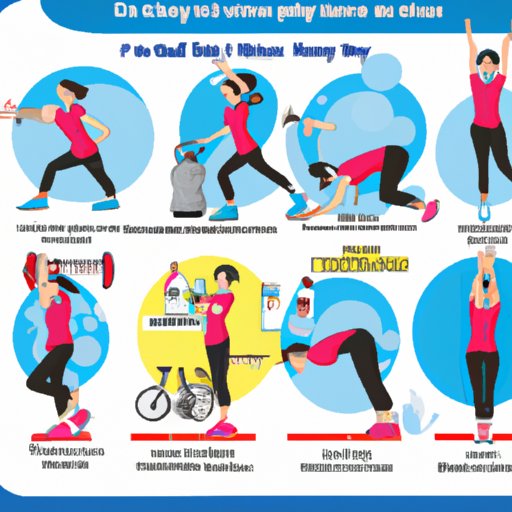Introduction
Exercise is an important part of maintaining a healthy lifestyle. It can help improve your physical and mental health, reduce stress, and increase your overall quality of life. But is it necessary to exercise every day? In this article, we’ll explore the benefits of exercising every day, how to create an effective routine, and nutrition tips for supporting your daily workouts.
Benefits of Exercising Every Day
There are many benefits to exercising every day. According to the World Health Organization, regular physical activity can reduce the risk of developing chronic diseases such as cardiovascular disease, type 2 diabetes, and some cancers. It can also help with weight management and improved mental health.
Mental and Physical Health Benefits
Regular exercise has been linked to improved mental health. According to a study published in The British Journal of Sports Medicine, people who exercised regularly reported better moods, reduced feelings of depression, and improved self-esteem. Exercise can also help reduce stress levels, improve sleep quality, and boost energy levels.
In addition to its mental health benefits, exercise can also help improve physical health. Regular physical activity can help strengthen bones and muscles, improve heart health, and reduce the risk of certain health conditions such as high blood pressure and stroke.
Improved Quality of Life
Regular physical activity can also help improve overall quality of life. A study published in the Annals of Internal Medicine found that people who exercised regularly reported higher levels of satisfaction with their lives than those who did not. They also reported feeling more energetic and less stressed.

How to Fit Exercise Into Your Busy Schedule
For many people, fitting exercise into their daily routine can be a challenge. Here are a few tips for making it easier:
Prioritize Exercise
If you want to make exercise a priority, it’s important to set aside time each day to do it. This could mean waking up earlier or making time after work. Whatever you decide, make sure you stick to it so that it becomes a habit.
Set a Schedule
Creating a schedule can help you stay on track with your exercise routine. Decide on the days and times you will exercise, and then stick to it. This will help you make exercise a priority and ensure that you stay consistent.
Find Time for Exercise
If you’re having trouble finding time for exercise, try to look for opportunities throughout your day. Take the stairs instead of the elevator, walk or bike to work, or take a break from work to go for a walk. Any amount of physical activity is better than none at all.
What Type of Exercise is Best for You?
The type of exercise you choose will depend on your individual goals and preferences. Here are a few tips for choosing the right type of exercise for you:
Consider Your Goals
Think about what you want to get out of your exercise routine. Do you want to lose weight, gain muscle, or just improve your overall fitness? Knowing your goals will help you determine which type of exercise is best for you.
Research Appropriate Types of Exercise
Once you know your goals, research different types of exercises that can help you reach them. Look for exercises that are safe and effective. Talk to your doctor or a fitness professional if you need help choosing the right type of exercise for you.
Work With a Professional
Working with a fitness professional can help you create an effective exercise routine. They can provide you with personalized advice and help you stay motivated. If you’re new to exercise, working with a professional can help you get started on the right foot.
How to Create an Exercise Routine That Works for You
Creating an exercise routine that works for you can help you stay motivated and consistent. Here are a few tips for creating an effective routine:
Choose an Exercise Type
Choose an exercise type that you enjoy and that fits into your lifestyle. Don’t feel like you have to stick to one type of exercise; mixing it up can help keep you from getting bored. Try different activities such as running, cycling, yoga, and strength training.
Set Realistic Goals
Setting realistic goals can help you stay motivated. Start small and gradually build up your intensity and duration. Setting attainable goals can help you stay on track and see progress.
Track Your Progress
Tracking your progress can help you stay motivated and see your improvements. Use an app or journal to record your workouts, or take before and after pictures to see your progress over time.
Reward Yourself
Rewarding yourself for reaching your goals can help you stay motivated. Find something that you enjoy and use it as a reward for reaching your goals. This could be a massage, a new outfit, or a night out with friends.

Reasons You Should Exercise Every Day
Exercising every day can have many benefits for your physical and mental health. Here are a few reasons why you should make it a habit:
Improved Physical and Mental Health
Regular physical activity can help improve your physical and mental health. It can reduce the risk of certain diseases, improve sleep quality, and boost your energy levels. It can also help reduce stress levels and improve your mood.
Increased Energy Levels
Exercising can help give you more energy throughout the day. Research has shown that regular physical activity can help reduce fatigue and improve overall energy levels.
Improved Concentration
Exercise can also help improve concentration and cognitive function. According to a study published in the journal NeuroImage, regular physical activity can help improve attention, executive function, and memory.

Nutrition Tips for Supporting Daily Exercise
Eating a healthy diet can help support your exercise routine. Here are a few nutrition tips for supporting your daily workouts:
Eat Healthy Foods
Eating a balanced diet is important for supporting your exercise routine. Choose nutrient-dense foods such as fruits, vegetables, lean proteins, and whole grains. Avoid processed and sugary foods, as they can cause energy spikes and crashes.
Drink Plenty of Water
Staying hydrated is important for supporting your workouts. Make sure to drink plenty of water throughout the day, especially before and after exercise.
Get Enough Sleep
Getting enough sleep can help you recover from your workouts and stay energized throughout the day. Aim for 7-9 hours of sleep per night.
Conclusion
Regular exercise has many physical and mental health benefits. It can help reduce the risk of certain diseases, improve sleep quality, and boost energy levels. It can also help improve your mood and overall quality of life. Making exercise a part of your daily routine can help you stay motivated and consistent. Eating a healthy diet and getting enough sleep can also help support your workouts. So make sure to prioritize exercise, set a schedule, and find time for it each day.
Summary of Benefits
Exercising every day has many benefits for physical and mental health. It can reduce the risk of certain diseases, improve sleep quality, and boost energy levels. It can also help improve your mood and overall quality of life.
Call to Action
Make sure to prioritize exercise, set a schedule, and find time for it each day. Eating a healthy diet and getting enough sleep can also help support your workouts.
(Note: Is this article not meeting your expectations? Do you have knowledge or insights to share? Unlock new opportunities and expand your reach by joining our authors team. Click Registration to join us and share your expertise with our readers.)
